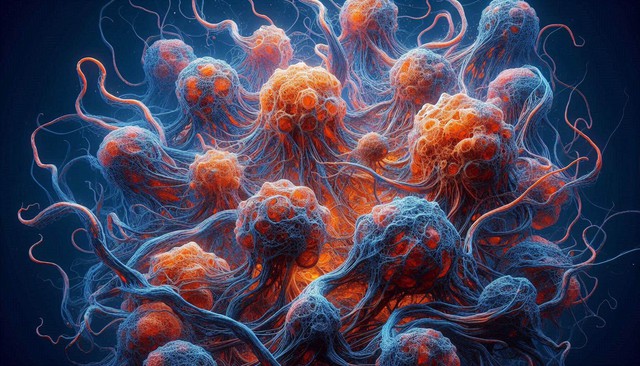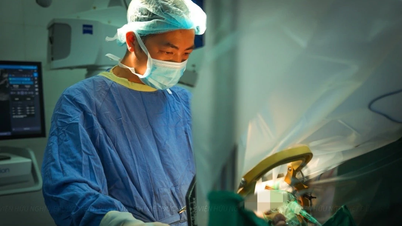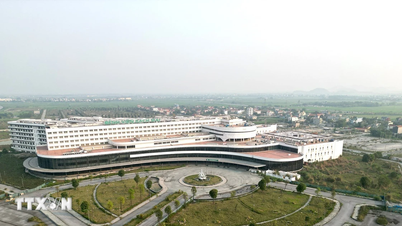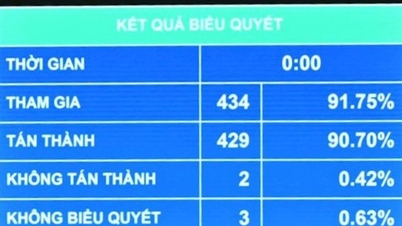Scientists at Semmelweis University (Hungary) have studied the anti-cancer effects of vitamin D, focusing specifically on its role in colorectal cancer (CRC).
They analyzed and evaluated 50 studies, including 1,305,997 participants, and found that:
Vitamin D has been shown to inhibit inflammation, boost immunity and prevent tumor growth to protect against colon cancer, according to News Medical .
Vitamin D has the ability to prevent colorectal cancer
Photo: AI
Vitamin D prevents CRC by enhancing immunity and inhibiting tumor growth. It enhances the function of immune organs such as the spleen and lymph nodes, and promotes the activity of T cells, which are essential for protecting the body against tumors.
Vitamin D has anti-inflammatory, antioxidant and anti-cancer properties, which can inhibit the growth of cancer cells, as well as reduce the ability of tumors to invade and metastasize.
Vitamin D deficiency exacerbates intestinal inflammation and promotes CRC progression.
The potential of vitamin D to prevent colorectal cancer
Research suggests that maintaining adequate vitamin D levels may reduce the risk of CRC. One meta-analysis found that people with higher blood levels of vitamin D had a 39% lower risk of CRC, according to News Medical.
Other studies have consistently confirmed the protective role of vitamin D against CRC.
Studies have shown that calcitriol, the active form of vitamin D, has antitumor effects by inhibiting cancer cell proliferation, inducing apoptosis, promoting cell differentiation, and inhibiting angiogenesis. It also modulates genes that control cell cycle, apoptosis, and immune response, and affects the tumor microenvironment, all of which contribute to inhibiting CRC tumor growth and progression.
Vitamin D deficiency significantly increases the risk of CRC, with numerous studies highlighting it as a major risk factor. Calcitriol helps maintain the differentiation and integrity of intestinal epithelial cells—essential for preventing CRC.
Vitamin D deficiency exacerbates intestinal inflammation and promotes CRC progression, vitamin D supplementation reduces these harmful effects.
Vitamin D is abundant in fatty fish.
Photo: AI
Dietary vitamin D supplementation helps prevent colorectal cancer
A meta-analysis of 31 studies found that dietary vitamin D consumption reduced the risk of CRC by up to 25%.
A study called the US Nurses' Health Study reported that women in the highest vitamin D intake group had a 58–67% reduced risk of colon cancer.
In the Iowa Women's Health Study (USA), after 5 years of follow-up, those in the group with the highest calcium and vitamin D consumption had about half the risk of colon cancer.
Another study found that higher baseline vitamin D intake reduced the risk of colon cancer by up to 33%. Additionally, the combination of calcium and vitamin D significantly reduced the risk of rectal cancer, especially in people with higher calcium and vitamin D intakes.
Researchers concluded: Vitamin D plays an important role in the prevention and treatment of colorectal cancer by reducing inflammation, regulating immune responses, and inhibiting the formation of new blood vessels in tumors.
Vitamin D can be supplemented by exposure to sunlight for 15-30 minutes in the early morning or through foods such as: fatty fish, liver, egg yolks and mushrooms. If you want to use supplements, consult your doctor.
Source: https://thanhnien.vn/loai-vitamin-duoc-50-nghien-cuu-xac-nhan-co-kha-nang-khoa-khoi-u-ung-thu-185250425205759822.htm








![[Photo] The captivating scenery of the fragrant maple forest in Quang Tri](/_next/image?url=https%3A%2F%2Fvphoto.vietnam.vn%2Fthumb%2F1200x675%2Fvietnam%2Fresource%2FIMAGE%2F2025%2F12%2F10%2F1765353233198_lan09046-jpg.webp&w=3840&q=75)
![[Photo] Explore the US Navy's USS Robert Smalls warship](/_next/image?url=https%3A%2F%2Fvphoto.vietnam.vn%2Fthumb%2F1200x675%2Fvietnam%2Fresource%2FIMAGE%2F2025%2F12%2F10%2F1765341533272_11212121-8303-jpg.webp&w=3840&q=75)

























![[Video] The craft of making Dong Ho folk paintings has been inscribed by UNESCO on the List of Crafts in Need of Urgent Safeguarding.](https://vphoto.vietnam.vn/thumb/402x226/vietnam/resource/IMAGE/2025/12/10/1765350246533_tranh-dong-ho-734-jpg.webp)









































































Comment (0)